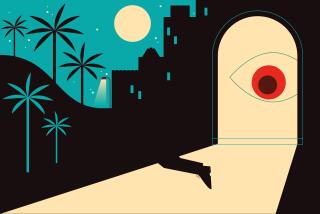ITALIAN STEREOTYPE
- Share via
Though I largely enjoyed David Ulin’s essay of May 14, “Back From the Dust” on the rediscovery of L.A. author John Fante, I was somewhat taken aback by statements made by author Gay Talese quoted in said essay.
Basically Talese states (I am paraphrasing) that there are no mentors for Italian-American writers because there are no Italian-American literature professors or literary critics. Surely Talese has heard of Frank Lentricchia, Gilbert Sorrentino and Pascal Covice who are all established writers and critics.
Talese also makes the blanket statement that Italian-Americans as a whole are not readers. Such a statement seems a bit presumptuous. Perhaps Talese is basing such remarks merely on personal experience, but I fear that many people will see such statements as proof that Italian-Americans are illiterate, book-hating louts.
SALVATORE SCANDURA, UPLAND
****
I must take issue with some of David Ulin’s comments in his otherwise complimentary review of a momentous literary event I am proud to have participated in: the first John Fante conference held in Long Beach May 4-5. Ulin found it most “unexpected” that the impressive national and international scholars directed so much attention “at the role Fante’s Italian-American heritage may [sic] have played in his career.”
Any reader would be hard pressed to find a novel or more than a handful of stories by Fante that did not show Italian-American ethnicity (and one’s working-class status) as central to the narratives.
For Ulin to state that Gay Talese’s “interesting” point of “providing a framework for reading Italian-American literature as a genre of its own” is actually more “emblematic of our current fixation with identity politics than of any essential thread in Fante’s work” is a slap in the face to Italian-Americans--and embarrassingly inaccurate. Fante’s Italian-American identity (and that of his characters) are essential threads in his work.
Fante’s inner life was linked to a “past” informed by the cultural aesthetic of the working class Italian-American family he grew up in and which found its way into so much of his fiction, causing H. L. Mencken to advise Fante to stop writing about his family for a while.
MARY BUCCI BUSH, LOS ANGELES
More to Read
Sign up for our Book Club newsletter
Get the latest news, events and more from the Los Angeles Times Book Club, and help us get L.A. reading and talking.
You may occasionally receive promotional content from the Los Angeles Times.










